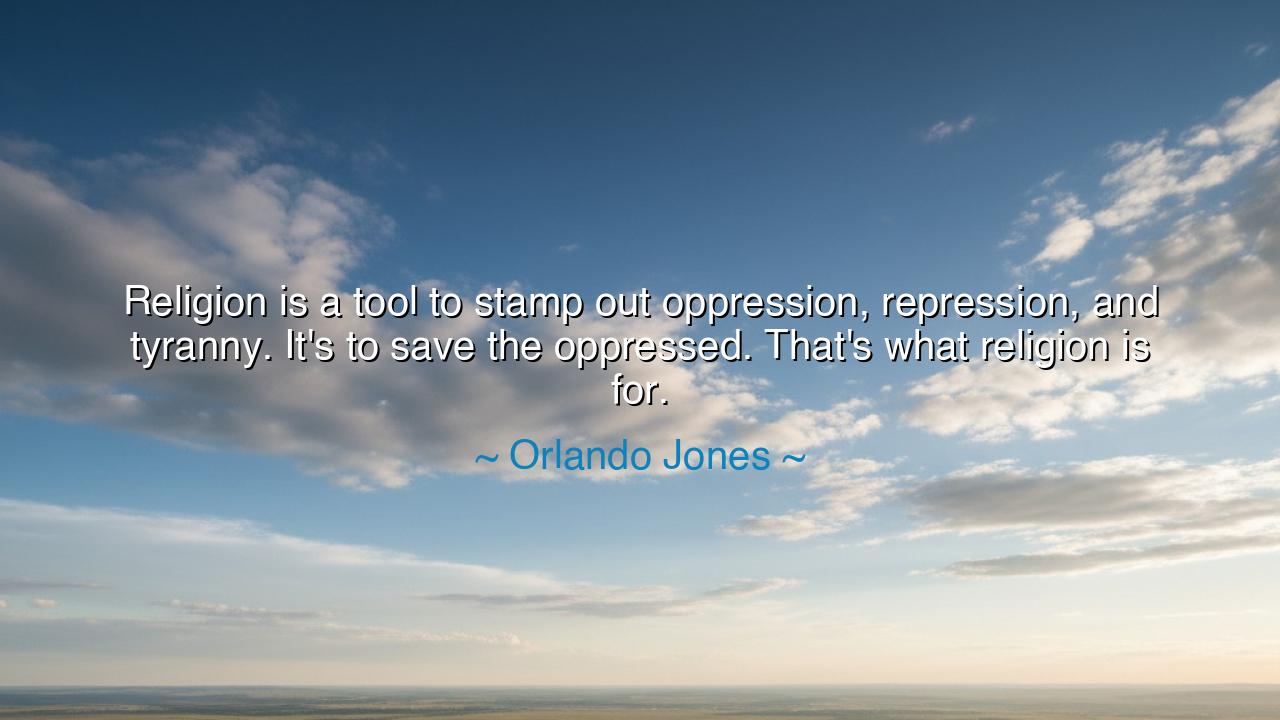
Religion is a tool to stamp out oppression, repression, and
Religion is a tool to stamp out oppression, repression, and tyranny. It's to save the oppressed. That's what religion is for.






"Religion is a tool to stamp out oppression, repression, and tyranny. It's to save the oppressed. That's what religion is for." These powerful words by Orlando Jones remind us of the essential role that religion has played throughout history in the fight against injustice and oppression. At its core, religion has often served as a beacon of hope and a source of strength for those suffering under the weight of tyranny, repression, and social injustice. While religion has at times been manipulated for control and power, its fundamental purpose, as Jones highlights, is to be a liberator—to uplift the oppressed and challenge the systems that keep them in chains.
In the ancient world, religion was a profound force that inspired many to stand against tyranny. Moses, for instance, led the Israelites out of the bonds of slavery in Egypt, not only as a political leader but as a prophet called to deliver his people from the oppression they endured under the Pharaoh’s rule. The Exodus story, deeply embedded in the Jewish faith, is one of divine intervention, where God’s guidance liberated an entire nation from the tyrannical grip of an oppressive ruler. Moses’ leadership serves as a testament to how religion can be wielded as a tool of liberation, empowering people to rise above their suffering and build a new, free life. The message is clear: religion is not merely about personal salvation but about societal transformation.
Consider also the example of Jesus Christ, whose teachings were fundamentally aimed at the marginalized and oppressed in ancient Judea. The Sermon on the Mount, one of the most famous and profound speeches in the history of the world, emphasized compassion, forgiveness, and the promise of the Kingdom of God for those who suffered under the harshness of Roman rule. Jesus’ message was revolutionary, calling on the downtrodden to find strength in their faith and to rise above the injustices they faced. Through his teachings, he redefined the very nature of power, showing that the greatest among us are not those who oppress others, but those who serve. His life became a symbol of resistance against tyranny—not with violence, but through love and self-sacrifice. In this way, religion became a tool of both spiritual and social revolution.
In more recent history, the influence of religion in fighting against oppression is also seen in the lives of Mahatma Gandhi and Martin Luther King Jr. Gandhi’s philosophy of nonviolent resistance was deeply rooted in his Hindu beliefs, and he used religion as a force to challenge British colonial rule over India. He believed that truth and nonviolence were the highest expressions of divine will, and through this, he empowered millions of oppressed Indians to rise up against their colonizers. Similarly, Martin Luther King Jr., drawing on the Christian message of love, led the American Civil Rights Movement, using the power of faith and nonviolent protest to confront the systemic oppression faced by African Americans. Both Gandhi and King were deeply aware of how religion could serve as a moral compass to fight against injustice and tyranny, calling people to action in the name of freedom and equality.
Orlando Jones' words are not only a reflection of historical truths but also a call to action in our own time. Religion, when practiced with integrity and purpose, can be a powerful force for good in the world. It can inspire individuals and communities to challenge systems of oppression, to stand up for those who cannot stand for themselves, and to demand justice in the face of inequality. We need look no further than the continuing struggles for human rights, where the teachings of religion continue to inspire movements that resist repression and tyranny—whether it’s the fight for freedom in Myanmar, racial equality in the United States, or the defense of refugees worldwide. In these struggles, religion is not just a private matter of personal devotion; it is the moral foundation for collective action aimed at transforming society.
The lesson that Jones offers us is that religion can be a catalyst for change—a tool that, when used with integrity, can fight against the forces of injustice. Yet this requires that we look beyond personal salvation and understand the broader social impact of our faith. True religion should inspire us to act, to resist tyranny, and to work for the liberation of all people. This requires courage, sacrifice, and a commitment to love and justice. We must not allow religion to become a tool for oppression but rather, as Goethe once said, a force for liberation.
In practical terms, we can take this lesson by using religion as a tool for justice in our own lives. Whether it is fighting for equality, standing up for the oppressed, or working to heal the divisions in our communities, we must remember that faith is not just about private devotion—it is about action in the world. By aligning our religious beliefs with justice, compassion, and solidarity, we can transform the world around us, just as those who have gone before us have done. Let religion guide us in building a world where all are free, and no one is left in the chains of oppression.






AAdministratorAdministrator
Welcome, honored guests. Please leave a comment, we will respond soon